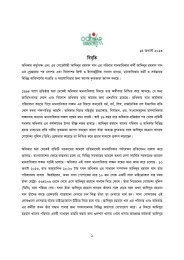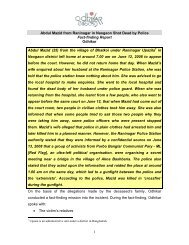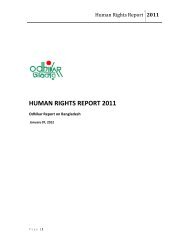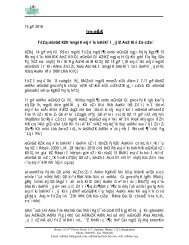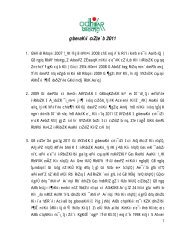Please - Odhikar
Please - Odhikar
Please - Odhikar
Create successful ePaper yourself
Turn your PDF publications into a flip-book with our unique Google optimized e-Paper software.
combined with the fact that no independent investigation power has been given amounts to a<br />
sever lacunae in effective intervention for rights'abuse.<br />
Limitation of the Code of Criminal Procedure, Indian Penal Code and Indian Evidence<br />
Act in Dealing with Mass Crimes:<br />
1. Failure of Criminal Justice system<br />
2. Failure of intelligence<br />
3. Preventive Arrests<br />
4. Police participation in the riots<br />
5. Illegal registration of FIRs (Problems with FIRs)<br />
a) their failure to record First Information Reports (FIRs) and in fact fie omnibus;<br />
b) police complicity in not naming the accused despite repeated insistence of the<br />
victim/survivors that all accused should be named;<br />
c) worst of all, their insistence on recording omnibus FIRs for whole areas, regions and<br />
towns instead of separate detailed ones for every crime and offence committed.<br />
Section 154 of the CrPC deals with the First Information Report of cognisable offences and is<br />
the first crucial step in prosecution of offenders.<br />
A. Omnibus FIRs<br />
It is a fundamental principle of criminal law that every offence needs to be separately registered,<br />
investigated and tried. Filing omnibus FIRs is one of the simplest ways of avoiding detailed<br />
investigations and effective trials. In many cases in Gujarat where 80 or 90 shops have been<br />
burnt or a large number of people have been killed, instead of filing separate FIRs in respect of<br />
each incident, the police has registered collective FIRs thus virtually scuttling the possibility of<br />
detailed investigation or conviction. Apart from this, many incidents separated over time<br />
(sometimes days) and place and concerning different victims and accused have been clubbed<br />
together. Moreover, when individuals came forward to lodge their FIRs, they were told the FIRs<br />
have already been recorded, and that no second FIR was possible.<br />
B. FIRs without names of accused<br />
Most of the FIRs which have been filed, especially where police is the informant, do not contain<br />
the names of the accused and only say that an unidentified mob attacked. There are significant<br />
number of cases where the victims actually named the accused but the Gujarat police have<br />
refused to lodge their names in the FIRs. Instead, the police took on the role of a partisan<br />
intermediary in evidence recorded from Naroda, Chamanpura, Odh, Sardarpura, Bharuch,<br />
Ankleshwar, Varodara, Mehsana, Himmatnagar, Sabarkantha and Banaskantha. In these cases,<br />
the police told the complainants that the FIR would be lodged only if the name of the accused is<br />
deleted. For example, at village Por, 3 women and 3 children were killed. The victims have<br />
identified and named 95 attackers but the police refused to include their names in the FIRs The<br />
detailed area wise list of incidents is covered by the Tribunal in the section on 'Summary of<br />
Evidence'.<br />
Report 2005<br />
177




